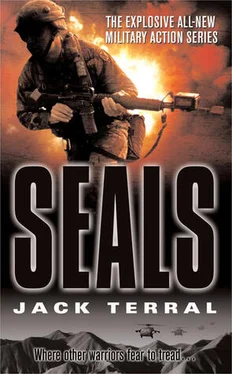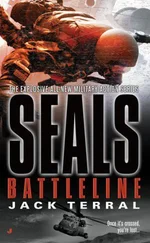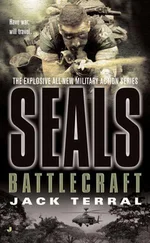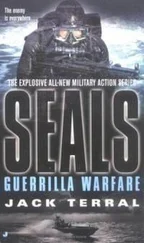Jack Terral - Seals (2005)
Здесь есть возможность читать онлайн «Jack Terral - Seals (2005)» весь текст электронной книги совершенно бесплатно (целиком полную версию без сокращений). В некоторых случаях можно слушать аудио, скачать через торрент в формате fb2 и присутствует краткое содержание. Жанр: Старинная литература, на английском языке. Описание произведения, (предисловие) а так же отзывы посетителей доступны на портале библиотеки ЛибКат.
- Название:Seals (2005)
- Автор:
- Жанр:
- Год:неизвестен
- ISBN:нет данных
- Рейтинг книги:3 / 5. Голосов: 1
-
Избранное:Добавить в избранное
- Отзывы:
-
Ваша оценка:
- 60
- 1
- 2
- 3
- 4
- 5
Seals (2005): краткое содержание, описание и аннотация
Предлагаем к чтению аннотацию, описание, краткое содержание или предисловие (зависит от того, что написал сам автор книги «Seals (2005)»). Если вы не нашли необходимую информацию о книге — напишите в комментариях, мы постараемся отыскать её.
Seals (2005) — читать онлайн бесплатно полную книгу (весь текст) целиком
Ниже представлен текст книги, разбитый по страницам. Система сохранения места последней прочитанной страницы, позволяет с удобством читать онлайн бесплатно книгу «Seals (2005)», без необходимости каждый раз заново искать на чём Вы остановились. Поставьте закладку, и сможете в любой момент перейти на страницу, на которой закончили чтение.
Интервал:
Закладка:
Aburrani knew that Khamami was a powerful warlord with four to five times the men Durtami had in his band. He had always thought that the day would come when the brother-in-law would add this fiefdom to his own. The envoy took a thoughtful sip of tea, then said, "Now I shall turn to another item of discussion. The opium poppy crops. How do they go?"
"The resin will be ready for shipment soon," the warlord said. "We have a good yield on this last crop of the year."
"That will please the cartel," Aburrani said.
Aburrani was deeply imbedded in the opium trade out of Afghanistan. He talked the talk with outsiders about eradicating poppy production, but walked the walk with the dealers. There was more than greed in his motive for being a part of this local illicit industry. It raised the standard of living of the farmers, for whom he had a great sympathy and understanding. These people needed every advantage they could obtain in order to ease their physical and spiritual misery. By raising the poppies and processing them, a farm family was able to purchase a good wood-burning stove, some furniture or even a motorbike. Communities could chip in and buy a communal truck, tractor or minibus to make their lives easier.
The Americans and Europeans provided the market for the crops, and if they didn't approve of heroin addiction, they should turn inwardly, into their own society, to get rid of it. Zaid Aburrani and scores of other Afghanistan leaders and officials were not going to sacrifice their people to assuage the hypocrisy of Western civilization. As long as there was a market, a product would be produced for it. Was that not the basic philosophy of the infidels and their capitalism?
"I must return to Kabul," Aburrani said, standing up. "I fear they will not meet your ransom demands."
"Tell them I need the money to put back in my treasury after purchasing the mortars," Durtami said. "It is the leaders like me that will guarantee Afghanistan for Afghans."
"I will tell them, Amir," Aburrani said with a slight bow. "De khudey pea man."
"Pa makha de kha."
Chapter 7
SOLS
THE PENTAGON, WASHINGTON, D. C.
15 AUGUST
0900 HOURS LOCAL
THE Special Operations Liaison Staff had an office in a little used area of the Pentagon. This small team had been organized to ease the efforts of coordination and communication between the various special operations branches of the nation's armed forces. Access to this small administrative group was severely limited. Only a select few military and political echelons knew of its existence.
The concept behind SOLS was not unlike the U. S. government's intention of placing intelligence matters into a more compact administrative body to expedite functions and exchange of information. The main purpose was to create a convenient method for the nation's sneakiest and hardest hitting components to communicate. Basically, they had to make sure the left hand knew what the right hand was doing among all special operations all over the world.
The officers assigned to SOLS performed duties that sounded much easier and simpler than what the jobs actually demanded. The hard part was to prevent misunderstandings and wrongful conclusions based on the available information. The officers chosen for this staff were all SOF veterans who had been injured in the line of duty. Rather than accept physical disability separations from the service, they chose to serve in administrative capacities while remaining on active duty.
The chief of this staff was Colonel John Turnbull, U. S. Army. This Delta Force veteran had broken his ankle on a parachute jump, and the fracture was deteriorating to the point that it eventually would have to be fused. That would leave him with less pain, but more crippled. The affected leg would be much shorter than the other.
Commander Timothy Jones, U. S. Navy, was a former SEAL with a hernia. Lieutenant Colonel Steve Lee, U. S. Air Force, had injured his back in a helicopter crash, while Major Scott Marchand, U. S. Marine Corps, had touched a live power line with his foot when coming in to make a PLF during a parachute jump at Tank Park DZ, Camp Pendleton, California. His right leg had been amputated just below the knee.
Their workdays went from very early in the morning to very late in the evening; and on one particularly screwed-up project that involved not only the military but politicians and diplomats, they worked for a straight thirty-six hours without a break, making sure that no inadvertent interference occurred during a multi-agency kidnapping and assassination in the same OA.
These four officers were ably served by only two administrative assistants, who were wise beyond their years. Both these young women were E-4s but in different branches of the service. Specialist Mary Kincaid was U. S. Army while Senior Airman Lucille Zinkowski was U. S. Air Force.
The day before, when an appointment was made for them to be visited by Carl Joplin of the State Department, the two young ladies cringed, knowing it was going to put their bosses in a bad mood. The undersecretary was well respected, but he generally didn't show up on their doorstep unless a situation seemed to be totally and irretrievably fucked up.
DR. Carl Joplin was escorted by a Marine from the Pentagon's east entrance through the building to an elevator that would take them to the bailiwick of SOLS. He was left at the door and he tapped on it, then stepped into the outer officer, where Kincaid and Zinkowski kept their desks. The young ladies--the former was twenty and the latter nineteen years of age--were collating the latest SPECOPS missions by date and location when Joplin made his appearance.
"Hello, young ladies," he said. "It's so nice to see you again."
"How are you, Dr. Joplin?" Zinkowski inquired as she slipped a training mission in Bosnia between a couple of Iraq agent insertions.
"I'm fine:' Joplin replied. "You look busy this morning."
"We're busy every morning, Dr. Joplin," Kincaid remarked. She got up and went to the inner door, opening it to speak to someone on the other side. "Dr. Joplin is here, sir." A muffled voice sounded from within, and she turned. "Colonel Turnbull and Commander Jones are waiting to see you."
Joplin went into what was a small central meeting chamber, with Zinkowski following. The four doors inside opened up on the private offices of the staff members. Turnbull and Jones were seated at a table in the center of the room. A standalone computer sat on the table, and Zinkowski took the chair in front of it. One of the jobs she and Kincaid were tasked with was the downloading of classified disks onto the staff 's CPU. This was done while the armed couriers who brought the data to the SOLS office waited. When the job was done, the couriers took the disks back to the vault, where they were stored under both electronic and human security measures.
Joplin reacted to an invitation to make himself at home by slipping into a chair. Both Turnbull and Jones were in their shirtsleeves with ties undone. They had the looks of men who had plenty to do that day and were impatient to get back to the tasks that awaited them.
"What can we do for you, Carl?" Turnbull asked.
"I've been approached by Zaid Aburrani," Joplin replied, knowing they had left some important work to take the time for this meeting. "I believe you're familiar with him."
"I don't know him personally, but his name has passed through here now and then," Turnbull conceded.
"Afghan, isn't he?" Jones asked.
"Yes," Joplin said. "He's got a sensitive situation in his home country involving one of the warlords. The man's name is Ayyub Durtami and he's holding a couple of their voter registration agents hostage. It would be to our advantage if the prisoners were rescued."
Turnbull wondered about the importance of rescuing such hostages, but he knew if it wasn't vital then Carl Joplin, PhD, would not be involved. "Would this warlord's name be the keyword in our search-and-find mode, Carl?"
Читать дальшеИнтервал:
Закладка:
Похожие книги на «Seals (2005)»
Представляем Вашему вниманию похожие книги на «Seals (2005)» списком для выбора. Мы отобрали схожую по названию и смыслу литературу в надежде предоставить читателям больше вариантов отыскать новые, интересные, ещё непрочитанные произведения.
Обсуждение, отзывы о книге «Seals (2005)» и просто собственные мнения читателей. Оставьте ваши комментарии, напишите, что Вы думаете о произведении, его смысле или главных героях. Укажите что конкретно понравилось, а что нет, и почему Вы так считаете.












